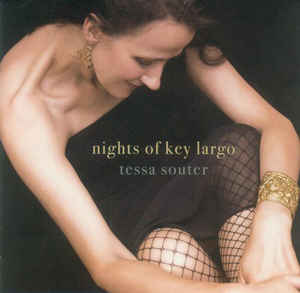 |
| Tessa Souter Nights of Key Largo Venus |
I was recently sent a copy of Nights of Key Largo, an album from the vocalist Tessa Souter. The
album was originally released on the Venus label in Japan in 2008 and was re-released here in the United States this year.
Ms. Souter is a London born singer who took to singing late
after a successful career as a copy editor, a freelance journalist and a
mother. She moved to the US in 1992 and attended the Manhattan School of Music meeting
and later being mentored by the late great Mark Murphy for four years. She has
also studied with the NEA master vocalist Sheila Jordan.
Ms. Souter’s work is marked by one of the most natural
voices in jazz today. Her delivery is clean, honest and emotionally sincere.
She has what musicians call great ears and a superb taste when choosing material to cover. She often finds inspiration in re-imagining songs that do not fall into
the repertoire that is generally associated with jazz. Some splendid examples of
this woman’s musical creativity include her flamenco-fused version of Cream’s
“White Room” and her treatment of the Beatles classic “Eleanor Rigby” both from
here 2009 album titled Obsession. She
extended her musical boundaries venturing into a successful fusion of jazz, pop
and classical on her fine 2012 album Beyond
the Blue, putting her own lyrics to jazz versions of Beethoven, Rodrigo and Chopin.
On Nights of Key Largo,
Ms. Souter, along with producers Tetsuo
Hara and Todd Barkan, assembled an intuitive group of musicians to accompany
her on this outing. The inimitable Kenny Werner on piano and I assume
arrangements, bassist extraordinaire Jay Leonhart, guitarist Romaro Lubambo, saxophonist Joel
Frahm and drummer Billy Drummond all add significantly to the overall success
of this effort.
Souter again finds some hidden gems that other singers seem
to miss. There is something for everyone
who loves great music on this album. Notable compositions include Ivan Lins romantic
“The Island,” where Ms. Souter’s breezy vocal and Frahm’s mellow tenor wrap you
in a sensuous blanket.
Van Morrison’s folk/jazz/blues classic “Moon Dance,” is given
to a jaunty treatment featuring Leonhart’s buoyant bass.
Lubambo’s lush guitar chording
is the perfect complement to Souter’s liquid vocal on “So Many Stars.”
Werner’s
beautiful piano accompaniment on Bachrach’s “Look of Love” is just transcendent
and Souter knows how to make the most of it with her unadorned approach.
On the
cinematic John Barry theme to James Bond “You Only Live Twice,” Souter’s voice
floats over Lubambo’s gentle guitar picking.
The oft neglected Benny Carter composition “Key Largo”
features Ms. Souter’s voice at it’s most sultry. This is adult contemporary at its best. Werner
is superlative and Leonhart and Drummond keep the walking time impeccably.
Lubambo’s delicate guitar and Drummond’s shimmering cymbals
introduce the Mancini classic “Slow Hot Wind” before Souter comes in with her
telling reading of the evocative lyrics, as Frahm offers a sensitive tenor solo.
The album continues with the lovely “Moon and Sand,” “I’m
Glad There is You” -with an exceptionally swinging solo by Frahm- “All or Nothing at All”,
“Morning of the Carnival” -with some beautiful arco work by Leonhart- and ending with John Lennon’s wistful and hopeful “Imagine.”
I've listened to this album several times now and it is utterly enjoyable. If her previous work hasn’t convinced you to pay attention
to this fine vocalist than the re-release of this hidden gem Nights of Key Largo should be all you
need to sit down, listen and enjoy the compelling sound of Tessa Souter.




